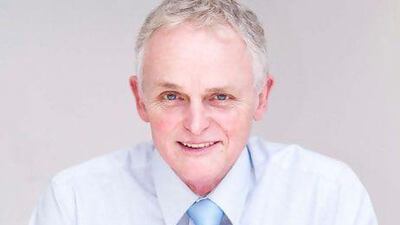Dr Steve Peters is a man with plenty of reasons to be happy.
The British sports psychiatrist's mental coaching of his home country's cycling team played a pivotal role in their triumphs at the 2012 London Olympics, where they bagged a record haul of gold medals. Now, his services are in huge demand among other sports people and teams.
On top of this, the mind management guidebook he wrote, The Chimp Paradox: The Mind Management Programme to Help You Achieve Success, Confidence and Happiness, is currently riding high in the UK's nonfiction charts.
So it's no wonder that Peters sounds buoyant when we call him in London before he travels to Dubai to take part in the Emirates Airline Festival of Literature, where he was a featured speaker on the Happiness Panel.
While he may have been grouped with a batch of self-help authors for this discussion, Peters was keen to distance himself and his work from this ilk of writers.
"I don't think I've written a self-help book," he says. "The term 'self-help' insinuates that there is something wrong, when I'm saying that most people recognise that they're functioning reasonably well but they could do better and they'd like to know how to do better."
This is achieved through his behavioural model. Peters contends that your personality consists of three separate parts: the chimp, the human and the computer. In essence, your successfulness depends on managing your chimp - the irrational, emotional side of your character - and its overpowering effects on your behaviour.
For example, an uncontrolled chimp can lead to actions that you later feel remorse about, such as overeating, anxiety in the face of adversity or outbursts of anger.
"People are always asking me: 'Why do I do these things that I don't agree with?' And I tell them it's a lack of understanding," he says. "And my theories do make sense as to how the mind works. It's quite normal and in some ways healthy for the mind. But that's the key. What is often healthy for the mind is not helpful in our society.
"For example, getting annoyed and shouting at someone is maybe what the mind does naturally but that's not actually the appropriate or best way to deal with things and you generally regret it later."
But can one really learn such self-control, and with it the trait of happiness, from a book?
To some extent, Peters believes one can. "I've never claimed that I will get people happier. But I will give a generic blueprint for how the mind is for humans, how we work with that and how we can sometimes go against nature," he says.
"I'm only saying you have a machine inside your head and it's a machine that you can operate with if you know what it is you're operating and what the rules are."
But, in terms of dedication and drive, the "machine" of an elite sporting star's mind must be vastly different from your average person's. So, although Peters clearly has proven his expertise at helping athletes achieve glory, do his theories apply to the rest of us?
"When I was hired by the cycling team, I knew nothing about cycling," he says. "Clearly the bulk of the work was done by the cyclists themselves and the coach.
"But a major part of sporting success is reliant on going in with the right mental attitude. I could bring that to the athletes, which they could then apply in training and in competition, then it's likely to improve performance.
"But this is true of whether you're in sport, in business or a member of the general public."
Despite numerous sports stars and teams vying for his services, plus his best-selling author status, Peters claims his chipper demeanour has a far simpler cause.
"Any doctor wants to improve people's quality of life. We want to help people. We want to stop suffering in people, whether that be physical suffering or psychological suffering," he says.
"So happiness for me is seeing other people happy. When I see somebody turn their life around and start being the person they want to be, that's what really makes me feel good."

